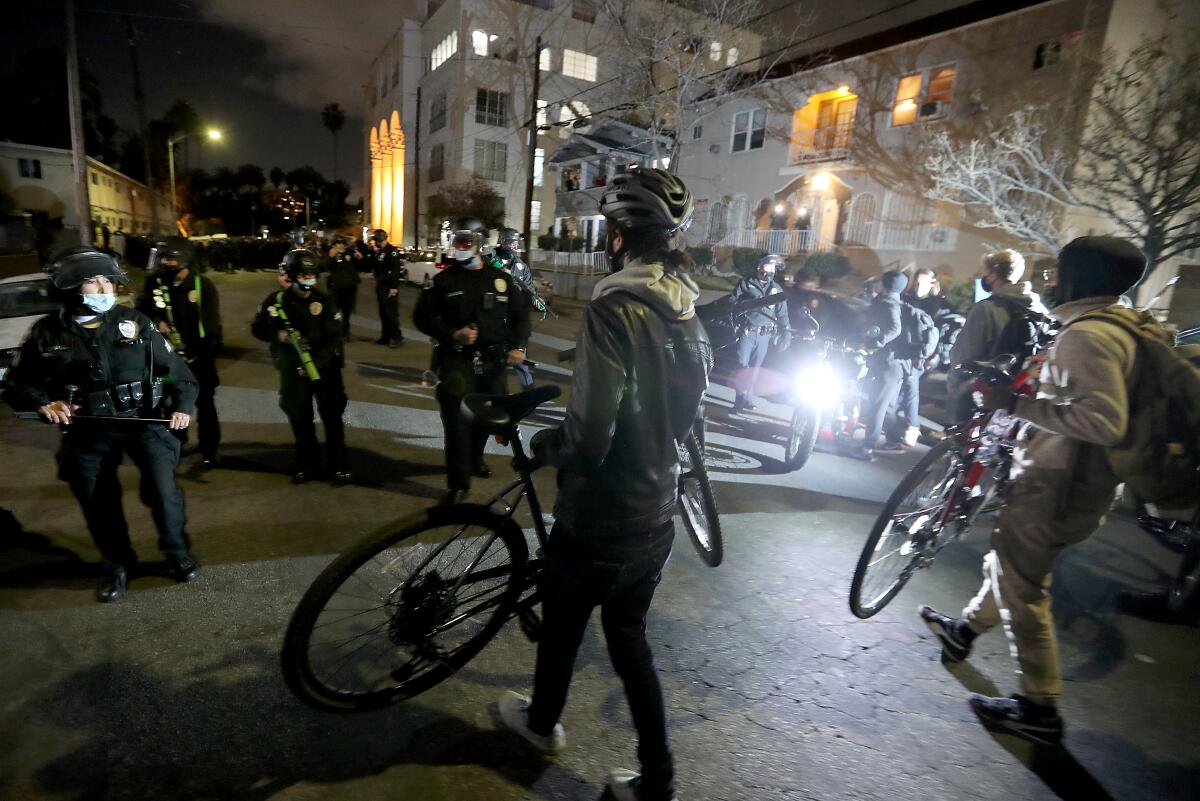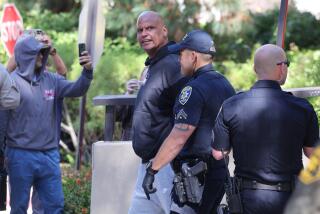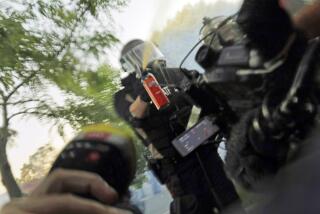Op-Ed: Arresting reporters in L.A. sends a dangerous message to repressive governments

- Share via
In the United States, and around the world, protests are vital forms of political expression. The ability of protesters to deliver their message depends on the presence of journalists, who not only inform the public but also hold the police accountable when they engage in violence or abuse.
But this fundamental right is being undermined by police abuse of journalists themselves, according to a new report by U.S. Press Freedom Tracker. In 2020, 142 journalists were arrested or detained when Black Lives Matter protests swept the nation. Although that number has declined this year, 56 arrests and detainments were documented in the U.S. through the end of November. Nearly 40% of those took place in Los Angeles County.
That record raises questions about the ability of people in Southern California to engage in political expression and sends a terrible message to the nation and the world.
Data compiled by the U.S. Press Freedom Tracker, which has documented press freedom violations in the United States since 2017, shows that the police abuse of journalists covering protests has become a deeply entrenched problem.
Not only are journalists routinely detained and arrested while covering protests, they are also often assaulted by police. Sixteen journalists were assaulted by police in 2021, and three had their equipment or footage confiscated. This is a pattern dating back to the Occupy Wall Street protests of 2008 and the 2014 racial justice protests in Ferguson, Mo.
Journalists arrested and detained in the L.A. area include experienced reporters such as L.A. Times reporter James Queally and independent freelancers like Sean Beckner-Carmitchel, who was arrested four times in the last two years, according to Tracker data.
Beckner-Carmitchel was working as a food writer and sommelier in L.A. in May 2020 when he saw on the news CNN correspondent Omar Jimenez being arrested while covering the unrest after the murder of George Floyd in Minneapolis. Beckner-Carmitchel decided to go out in the street with his cellphone to document the protests that broke out across L.A. and post the video on social media.
His protest video has been used by mainstream media sites like the New York Post and KTLA. He later obtained a press credential from the National Press Photographers Assn. and was making a living as a freelance video journalist.
Ironically, Beckner-Carmitchel says his treatment by police did not improve after he acquired a press credential. He was arrested in March 2021 along with 18 other journalists when police broke up a homeless encampment in Echo Park, and again in July, when police and sanitation workers broke up a homeless encampment in Harbor City.
The Los Angeles Press Club has challenged the record of both the Los Angeles Police Department and the L.A. County Sheriff’s Department, says Adam Rose, who serves as chair of the organization’s press rights committee. Rose worked with media organizations in Los Angeles and the state to document more than 50 incidents in which members of the press were detained or hurt in interactions with police and to engage with police to increase understanding and reduce incidents.
Rose said he has had productive discussions with police officials but that they tend to resist his argument that “journalists are a kind of first responder whose job it is make sure the public is informed.” In October, Gov. Gavin Newsom signed into law Senate Bill 98, which requires that journalists be given unrestricted access to protests and prohibits law enforcement from assaulting, interfering with or obstructing journalists from covering such events. Rose hopes the new legislation will lead to changes in police behavior.
Capt. Stacy Spell, a spokesman for the LAPD, said that many of the requirements under the new law have already been implemented and that the department is working with the Press Club to “improve the situation” and determine “who is considered a journalist.”
The implications extend far beyond Los Angeles. The arrest of journalists covering protests undermines American democracy and provides an awful example globally. Images of journalists in the U.S. being beaten and arrested by police are readily exploited by repressive governments to justify their own heavy-handed responses to street protests and demonstrations.
People in Los Angeles, across the nation and around the world are increasingly taking to the streets to express themselves politically. Los Angeles, which has a poor record on this front, needs to demonstrate its commitment to a free and unfettered press.
Joel Simon is executive director of the Committee to Protect Journalists.
More to Read
A cure for the common opinion
Get thought-provoking perspectives with our weekly newsletter.
You may occasionally receive promotional content from the Los Angeles Times.










